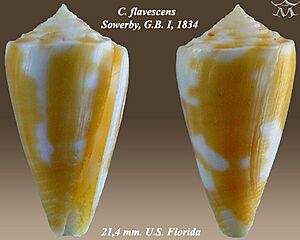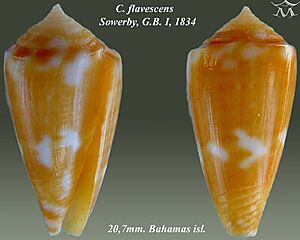Conus flavescens facts for kids
Quick facts for kids Conus flavescens |
|
|---|---|
 |
|
| Apertural and abapertural views of shell of Conus flavescens Sowerby, G.B. I, 1834 | |
| Conservation status | |
| Scientific classification |
|
| Kingdom: | Animalia |
| Phylum: | Mollusca |
| Class: | Gastropoda |
| Subclass: | Caenogastropoda |
| Order: | Neogastropoda |
| Superfamily: | Conoidea |
| Family: | Conidae |
| Genus: | Conus |
| Species: |
C. flavescens
|
| Binomial name | |
| Conus flavescens G. B. Sowerby I, 1834
|
|
| Script error: The function "autoWithCaption" does not exist. | |
| Synonyms | |
|
|
Script error: No such module "Check for conflicting parameters".
The Conus flavescens, often called the flame cone, is a type of sea snail. It's a marine gastropod, which means it's a kind of mollusk that moves on a "stomach-foot." This snail belongs to the Conidae family, also known as cone snails.
There is also a special type of this snail called Conus flavescens caribbaeus. It was identified in 1942.
Like all cone snails, Conus flavescens is a predatory animal. This means it hunts other creatures for food. These snails are also venomous. They can "sting" humans, so it's very important to be careful. You should never touch a live cone snail.
Where Flame Cones Live
The Conus flavescens snail lives in the ocean. Scientists believe its original home might have been the Bahamas.
Today, you can find this marine species in several places. It lives in the Caribbean Sea and the Gulf of Mexico. You can also find it off the coast of Florida, USA, near the Greater Antilles, and around the Bahamas.
What Flame Cones Look Like
The shell of the Conus flavescens can grow up to 25 millimeters long. That's about one inch!
The shell is smooth and has grooves near its base. Its color is usually yellowish. It has large, uneven white patches. These patches are often found just below the top part of the shell and near the middle. They form two broken bands around the shell.
Flame Cone Habitat
These snails live in the ocean from the surface down to about 122 meters deep. That's about 400 feet!
Gallery
Here are some pictures showing the different colors and patterns of the Conus flavescens shell:
 | Georgia Louise Harris Brown |
 | Julian Abele |
 | Norma Merrick Sklarek |
 | William Sidney Pittman |











